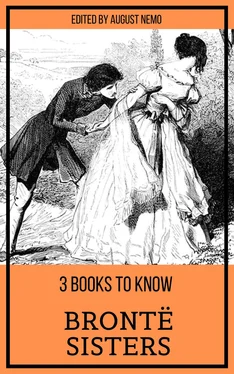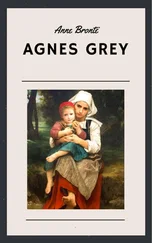I gave an involuntary start back on seeing her, at which she uttered a short laugh, observing, ‘I think we are both disappointed.’
I came forward and busied myself with the breakfast things.
‘This is the last day I shall burden your hospitality,’ said she, as she seated herself at the table. ‘Ah, here comes one that will not rejoice at it!’ she murmured, half to herself, as Arthur entered the room.
He shook hands with her and wished her good-morning: then, looking lovingly in her face, and still retaining her hand in his, murmured pathetically, ‘The last—last day!’
‘Yes,’ said she with some asperity; ‘and I rose early to make the best of it—I have been here alone this half-hour, and you—you lazy creature—’
‘Well, I thought I was early too,’ said he; ‘but,’ dropping his voice almost to a whisper, ‘you see we are not alone.’
‘We never are,’ returned she. But they were almost as good as alone, for I was now standing at the window, watching the clouds, and struggling to suppress my wrath.
Some more words passed between them, which, happily, I did not overhear; but Annabella had the audacity to come and place herself beside me, and even to put her hand upon my shoulder and say softly, ‘You need not grudge him to me, Helen, for I love him more than ever you could do.’
This put me beside myself. I took her hand and violently dashed it from me, with an expression of abhorrence and indignation that could not be suppressed. Startled, almost appalled, by this sudden outbreak, she recoiled in silence. I would have given way to my fury and said more, but Arthur’s low laugh recalled me to myself. I checked the half-uttered invective, and scornfully turned away, regretting that I had given him so much amusement. He was still laughing when Mr. Hargrave made his appearance. How much of the scene he had witnessed I do not know, for the door was ajar when he entered. He greeted his host and his cousin both coldly, and me with a glance intended to express the deepest sympathy mingled with high admiration and esteem.
‘How much allegiance do you owe to that man?’ he asked below his breath, as he stood beside me at the window, affecting to be making observations on the weather.
‘None,’ I answered. And immediately returning to the table, I employed myself in making the tea. He followed, and would have entered into some kind of conversation with me, but the other guests were now beginning to assemble, and I took no more notice of him, except to give him his coffee.
After breakfast, determined to pass as little of the day as possible in company with Lady Lowborough, I quietly stole away from the company and retired to the library. Mr. Hargrave followed me thither, under pretence of coming for a book; and first, turning to the shelves, he selected a volume, and then quietly, but by no means timidly, approaching me, he stood beside me, resting his hand on the back of my chair, and said softly, ‘And so you consider yourself free at last?’
‘Yes,’ said I, without moving, or raising my eyes from my book, ‘free to do anything but offend God and my conscience.’
There was a momentary pause.
‘Very right,’ said he, ‘provided your conscience be not too morbidly tender, and your ideas of God not too erroneously severe; but can you suppose it would offend that benevolent Being to make the happiness of one who would die for yours?—to raise a devoted heart from purgatorial torments to a state of heavenly bliss, when you could do it without the slightest injury to yourself or any other?’
This was spoken in a low, earnest, melting tone, as he bent over me. I now raised my head; and steadily confronting his gaze, I answered calmly, ‘Mr. Hargrave, do you mean to insult me?’
He was not prepared for this. He paused a moment to recover the shock; then, drawing himself up and removing his hand from my chair, he answered, with proud sadness,—‘That was not my intention.’
I just glanced towards the door, with a slight movement of the head, and then returned to my book. He immediately withdrew. This was better than if I had answered with more words, and in the passionate spirit to which my first impulse would have prompted. What a good thing it is to be able to command one’s temper! I must labour to cultivate this inestimable quality: God only knows how often I shall need it in this rough, dark road that lies before me.
In the course of the morning I drove over to the Grove with the two ladies, to give Milicent an opportunity for bidding farewell to her mother and sister. They persuaded her to stay with them the rest of the day, Mrs. Hargrave promising to bring her back in the evening and remain till the party broke up on the morrow. Consequently, Lady Lowborough and I had the pleasure of returning tête-à-tête in the carriage together. For the first mile or two we kept silence, I looking out of my window, and she leaning back in her corner. But I was not going to restrict myself to any particular position for her; when I was tired of leaning forward, with the cold, raw wind in my face, and surveying the russet hedges and the damp, tangled grass of their banks, I gave it up and leant back too. With her usual impudence, my companion then made some attempts to get up a conversation; but the monosyllables ‘yes,’ or ‘no’ or ‘humph,’ were the utmost her several remarks could elicit from me. At last, on her asking my opinion upon some immaterial point of discussion, I answered,—‘Why do you wish to talk to me, Lady Lowborough? You must know what I think of you.’
‘Well, if you will be so bitter against me,’ replied she, ‘I can’t help it; but I’m not going to sulk for anybody.’ Our short drive was now at an end. As soon as the carriage door was opened, she sprang out, and went down the park to meet the gentlemen, who were just returning from the woods. Of course I did not follow.
But I had not done with her impudence yet: after dinner, I retired to the drawing-room, as usual, and she accompanied me, but I had the two children with me, and I gave them my whole attention, and determined to keep them till the gentlemen came, or till Milicent arrived with her mother. Little Helen, however, was soon tired of playing, and insisted upon going to sleep; and while I sat on the sofa with her on my knee, and Arthur seated beside me, gently playing with her soft, flaxen hair, Lady Lowborough composedly came and placed herself on the other side.
‘To-morrow, Mrs. Huntingdon,’ said she, ‘you will be delivered from my presence, which, no doubt, you will be very glad of—it is natural you should; but do you know I have rendered you a great service? Shall I tell you what it is?’
‘I shall be glad to hear of any service you have rendered me,’ said I, determined to be calm, for I knew by the tone of her voice she wanted to provoke me.
‘Well,’ resumed she, ‘have you not observed the salutary change in Mr. Huntingdon? Don’t you see what a sober, temperate man he is become? You saw with regret the sad habits he was contracting, I know: and I know you did your utmost to deliver him from them, but without success, until I came to your assistance. I told him in few words that I could not bear to see him degrade himself so, and that I should cease to—no matter what I told him, but you see the reformation I have wrought; and you ought to thank me for it.’
I rose and rang for the nurse.
‘But I desire no thanks,’ she continued; ‘all the return I ask is, that you will take care of him when I am gone, and not, by harshness and neglect, drive him back to his old courses.’
I was almost sick with passion, but Rachel was now at the door. I pointed to the children, for I could not trust myself to speak: she took them away, and I followed.
Читать дальше











